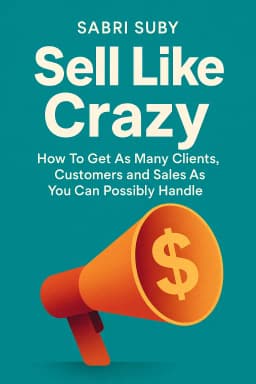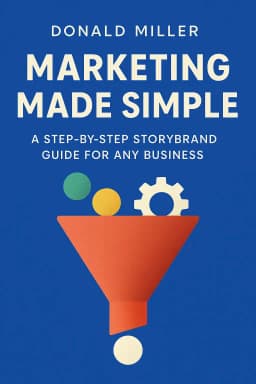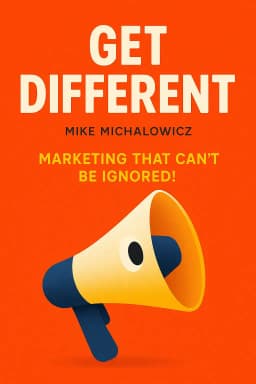
Beyond the Algorithm
Golden Hook & Introduction
SECTION
Olivia: Studies show we see thousands of pieces of content a day, but our brains only retain about 20%. That means 80% of what you scroll past is just digital garbage. The question is, who’s going to sort through the trash for us? Jackson: Wow, 80%? That feels both depressingly accurate and a little insulting to my cat video collection. But you’re right, most of the internet feels like a firehose of noise. We need a bouncer for the information nightclub. Olivia: A bouncer is a great way to put it. And that's the exact problem Steven Rosenbaum, an Emmy-winning filmmaker and media entrepreneur, tackles in his book, Curate This!: The Hands-On, How-To Guide to Content Curation. Jackson: An Emmy-winner writing about content curation? That's an interesting combo. I'm guessing he's seen his fair share of information overload, probably on a much grander scale than my social media feed. Olivia: Exactly. He was a pioneer in user-generated content back in the 90s and even donated a massive video archive to the 9/11 Memorial & Museum. He's been at the forefront of sorting signal from noise for decades. He argues that the person who sorts the trash for us isn't just a bouncer or a filter. They're an artist. Jackson: Hold on. An artist? That sounds a bit dramatic. Aren't we just talking about finding and sharing cool links? I mean, I share articles in my group chat. Does that make me the Picasso of my friend group? Olivia: (laughs) Well, maybe! But Rosenbaum’s point is that there’s a huge difference between just collecting things and truly curating them. It’s about creating something new out of the abundance.
The Soul of the Curator: More Than Just a Human Algorithm
SECTION
Jackson: Okay, I’m intrigued but skeptical. Unpack this "art" for me. How is finding a few articles and putting them in a newsletter an act of creation? Olivia: The book uses a brilliant analogy: a disc jockey. Think about it. All DJs start with the same raw material—songs. Some DJs just press play on a list of popular tracks. That’s aggregation. It’s useful, but it’s not an art form. Jackson: Right, that’s the wedding DJ playing "YMCA" for the thousandth time. Got it. Olivia: Exactly. But then you have artists like Girl Talk, who the book mentions. He takes tiny samples from hundreds of different songs—a drum beat from one, a vocal from another, a guitar riff from a third—and weaves them together to create an entirely new piece of music. He’s not just playing songs; he’s creating a new experience. That, Rosenbaum argues, is what a great curator does. They’re a mixologist, combining different elements to create a unique vision. Jackson: I like that. The curator as a DJ or a mixologist. It’s less about being a librarian and more about hosting a party. So you’re not just saying "here's some stuff," you're setting a vibe, creating a flow. Olivia: You've nailed it. And that requires a distinct, human touch. The book contrasts the traditional curator, like someone at the Museum of Modern Art, with the modern digital curator. The MOMA curator gets to work with art that has already been vetted and celebrated by critics and historians. Their job is to arrange it thoughtfully. Jackson: They’re working with a pre-approved playlist, basically. Olivia: A very expensive, pre-approved playlist. But the digital curator is facing something completely different. They’re standing in front of that firehose of unfiltered, raw information we talked about. They have to make snap judgments, relying on what the book calls a "gut feeling" to find the gems in the noise. It’s an act of leadership, of saying, "Hey everyone, ignore the 99% of junk over there. Look at this 1% I found. This is what matters." Jackson: That word "leader" pops up again. It feels like a big claim for someone who runs a newsletter about, say, vintage synthesizers. Olivia: But think about it! If you’re the go-to person for vintage synth news, you are leading that community's conversation. You’re defining what’s important, what’s a waste of time, and what’s the next big thing. Rosenbaum says curators need to be bold and charismatic, willing to take risks and make predictions. You have to have a voice, a point of view. And that voice won't be for everyone, which is a key point. Some people will disagree with your "mix," and that’s okay. Jackson: That’s a great point. A strong taste is inherently polarizing. If you love everything, you stand for nothing. So the "art" is really about having a strong, confident perspective. It’s not just about finding content, but framing it. Olivia: Precisely. The book quotes someone saying, "By framing the conversation rather than just contributing to it, you’re providing a unique and valuable resource: context." That context is the art. It’s the human layer an algorithm can't replicate.
The Curator's Tightrope: Navigating Ethics, Law, and SEO
SECTION
Jackson: Alright, so you're a DJ with a strong point of view. I'm on board with that. But you're still using other people's music. When does that become stealing? I've seen some mixed reviews on this book, and this ethical gray area seems to be a big reason why. It’s a fine line. Olivia: It is, and the book dives right into that tension. Rosenbaum is very clear that the legal world often lags behind what’s happening in technology and culture. So he lays out a framework based on best practices and the legal concept of "Fair Use." Jackson: Ah, Fair Use. The two most confusing words on the internet. Everyone thinks they know what it means, but nobody actually does. Olivia: (laughs) It’s definitely murky. But the book simplifies it with a great concept: the "three-legged stool." You have the content creator, the curator, and the consumer. For curation to be ethical and sustainable, all three legs of that stool need to be stable. The system has to work for everyone. Jackson: Okay, so how do you keep the stool from wobbling and collapsing into a lawsuit? Olivia: The book outlines some clear best practices. First, you only excerpt, you don't lift the whole thing. Take a key paragraph or a powerful quote, not the entire article. Second, you must provide clear and prominent attribution. Third, and this is crucial, you have to link back to the original source. The goal is to send your audience to the creator, not hoard them. Jackson: That makes sense. You’re acting like a movie trailer, not a pirated copy of the film. You’re giving a taste to entice people to see the original. Olivia: That’s the perfect analogy. And the fourth, most important practice is to add your own context and commentary. This is what truly separates curation from theft. You’re not just reposting; you’re explaining why this piece of content matters. You’re adding your own value. Jackson: So, if I do all that, am I legally in the clear? Olivia: It puts you on much firmer ground. The book references Patricia Aufderheide, a leading expert on Fair Use, who argues that curators are creative actors, just like editors or museum curators. They create something new—the collection itself. But there's also a very practical, non-legal reason to do this right: Google. Jackson: Of course. The ultimate judge, jury, and executioner of the internet. How does SEO play into this? Olivia: This was one of the most fascinating parts for me. The book details a study by an internet marketing company, Bruce Clay, Inc. They tested different types of curated content to see how they ranked in search results. The post that just automatically summarized articles and linked out? Its rank plummeted. Jackson: Because it looked like a spammy content farm. Olivia: Exactly. The post that had curated links plus over 200 words of unique, original commentary from the curator? It ranked right at the top, matching the rank of the original article it was curating. Jackson: Whoa. So there’s a magic number? 200 words of your own thoughts? Olivia: It’s a good rule of thumb. It signals to Google—and to your readers—that a human was here, thinking, analyzing, and adding value. The core principle the book hammers home is this: if your curation is a "dead end" that just benefits you, you're doing it wrong, ethically and practically. If it’s a "doorway" that sends people to discover the original creator while benefiting from your context, you've created a win-win. That’s the balance of the tightrope.
The Curator's Endgame: Building Community and Cashing In
SECTION
Olivia: And creating that win-win, that doorway, is how you move from just being a curator to being a community builder. It’s the endgame. Jackson: Okay, so you’ve got your DJ skills, you’re walking the ethical tightrope. How does that translate into a "community"? That word gets thrown around a lot. Olivia: The book gives a fantastic, forward-thinking example from a publishing expert named Joe Wikert. He imagined a future where you don't subscribe to a massive publication like, say, the New York Times. The volume is just too much. Instead, you subscribe directly to your favorite curator of the New York Times. Jackson: So I wouldn't pay the newspaper, I'd pay a person I trust to read it for me and just send me the five articles that matter to my specific interests? Like, a personal sports editor? Olivia: Exactly! A curator for sports, another for business, another for local politics. These curators get full access behind the paywall, and they build their own brand and following by being the best filter. It’s a powerful model because it’s built on trust and a shared interest. That’s a real community. Jackson: That’s a really cool idea. It feels like the logical conclusion of the creator economy. We’ve already seen it happen with social media news. Think about the rise and fall of Digg versus the success of Reddit. Olivia: The book brings up that exact case study! Digg, in its later years, became more top-down and lost the trust of its community. Reddit, on the other hand, thrived because it’s all about community-driven curation. Users submit content, but the community votes on it, and the best curators are rewarded with "karma." They built a system that empowers the crowd to be the curator. Jackson: And that karma, that reputation, is a form of social currency. But let’s talk about actual currency. Can you really make money doing this? Olivia: Absolutely. The book lays out three main monetization models. The first is advertising, which is straightforward if you have a consistent audience. The second is subscriptions, just like Joe Wikert's idea. People will pay for high-quality, time-saving curation. And the third is e-commerce. If you curate the best hiking gear, you can use affiliate links or even sell your own branded products. Jackson: That makes sense. You build trust first, then you can recommend products or services. Olivia: But the book makes one point that is absolutely critical for anyone thinking about this. Scott Scanlon is quoted, and he says you have to "own the click." Jackson: Own the click? What does that mean? Olivia: It means you can't build your entire curation empire on someone else's platform, like Facebook or Twitter. You're building value for their asset, not your own. And they can change the algorithm overnight and wipe you out. To truly control your destiny and your ability to monetize, you need to own the platform—your own blog, your own website, and most importantly, your own email list. That direct relationship with your community is the most valuable asset you can have.
Synthesis & Takeaways
SECTION
Jackson: So when you piece it all together, it's a pretty powerful roadmap. It's not just about finding links. It's about developing a unique voice, adding real value in an ethical way, and then using that trust to build a tribe that you can serve. Olivia: That's the perfect summary. And what's so resonant about Rosenbaum's message, especially now, is that in an age of advancing AI and powerful algorithms, human taste, human context, and human leadership are becoming more valuable, not less. An AI can aggregate, but it can't lead. It can find patterns, but it can't have a point of view. Jackson: It can’t be a DJ. It can only play the hits. It can't create the remix. Olivia: Exactly. The book really challenges you to see yourself not just as a consumer of information, but as a potential shaper of it. The ultimate question it leaves us with is a personal one, and I think it's a great one for our listeners to reflect on. Jackson: What's that? Olivia: What chaos in your world—whether it's in your industry, your hobby, or your community—are you uniquely qualified to bring order to? What conversation are you meant to frame? Jackson: That’s a fantastic question. It reframes curation from a task into a purpose. We'd love to hear what our listeners think. What's the niche you'd love to curate? Let us know on our socials. Olivia: This is Aibrary, signing off.









